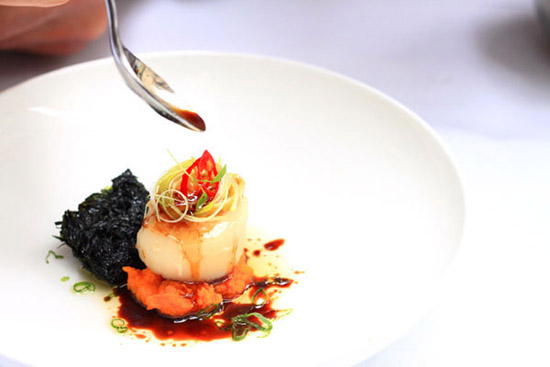
 |
| Alvin Leung's take on the scallop. [Photo/CRI Online] |
Food is one edge of culture that can push forwards pretty fast. And the urban centers are where Chinese food is covering uncharted territory. Classic dishes hold their ground and always will, but sometimes sushi squeezes into the back of the same menu. Also increasingly more restaurants in Hong Kong, Shanghai and Beijing are reinterpreting traditional Chinese cuisine in ways that would delight (and possibly disgust) the old gastronomic scholar Su Shi.
"A contemporary Chinese restaurant, to me, would be a restaurant that takes Chinese cooking and tries to expand it to a new level," quipped Time Out Beijing food editor Sean Silbert, mentioning Michelin star chef Alvin Leung, who recently visited Beijing.
Leung's restaurant, Bo Innovation, made its reputation selling "X-Treme Chinese" cuisine, a daring combination of fusion and molecular gastronomy. (Molecular gastronomy is a new culinary style which applies technological innovation to create flavors and textures previously impossible). "Leung's the kind of guy that does xiaolongbao, but with egg drop soup inside," explained Silbert. "Modern Chinese food takes Chinese culinary traditions and doesn't just run on the history, but makes it their own and does something a bit more interesting."
The vast variety of Chinese foods is proving to be an unexplored playground for modern and fusion cuisines. Fusion food is particularly relevant in today's shrinking but global-minded world. The likes of Mexican pizza or the California roll are now ubiquitous across the planet, having sunk their teeth into mainstream cuisine.
But fusion food has its share of detractors as well. Silbert, in his off-the-cuff manner, described fusion food as "stupid; and it shouldn't be encouraged." He cited chefs who slam together elements from disparate cultures to see what sticks, noting that the results are often "kitschy." He shortly remembered himself and backtracked, just a bit. "Sometimes it works … but it takes a very-trained chef to do it," he conceded.
The upcoming CRI English video series Chopsticks & Beyond is going to put Silbert's words to the test, inviting professional and hobby chefs alike to see just how the cuisine from their home country and Chinese cuisine can possibly fit together. Guests will rack their brains and taste buds to put their spin on Chinese classics.
Some segments of Chopsticks & Beyond will introduce guests to some of the more extreme sides of Chinese cuisine. In China, if it moves and has organs, there's a way to cook it. CRI is scouring the depths of the provinces to find the cuisine that will raise eyebrows and screw up faces.
One obvious requirement to be a food editor in China is an adventurous palate. But even Silbert has foods that he can't take. "Stinky tofu!" he exclaimed. "Start and end. I'll eat pretty much everything, but that one's hard for me."
Time Out Beijing and its esteemed food awards have also undeniably played a role in shaping cuisine in the capital and beyond. Their awards join those of 55 other cities around the globe, providing a local perspective to travelers from abroad. This month, Time Out will share the names of this year's best restaurants, and the people's choice awards.
Of course, top restaurants aren't built on prizes, but on solid food and service. "If you do meritable work in the restaurant field and you win a Time Out food award, that's a big deal," Silbert said, noting that last year's awards are still one of the website's most viewed pages. "People pay attention." The Time Out food awards take place April 25.
















 China's weekly story
China's weekly story
(2013.4.8-4.12)


![]()
